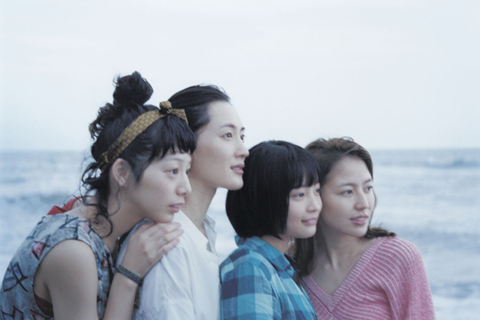Dir/scr. Hirokazu Kore-eda. Japan, 2015. 126 min.

Yasujiro Ozu hovers all over Our Little Sister (Umimachi Diary), Hirokazu Kore-eda’s adaptation of a graphic novel about three sisters who attend their father’s funeral, find out they have a younger half-sister and decide on the spur of the moment to adopt her. The settings are modern and the camera is not submitted to the rigors of the late master, but somehow the deliberately unhurried pace, the subtle, unprepossessing storytelling, the profound humanity of all the characters and the emotional undercurrents hidden beneath the calm, composed surfaces, suggest the master is here in spirit.
(It is no accident that Kore-eda chose to shoot the entire film in Kamakura, a small beach town outside Tokyo which is the final resting place of the great Ozu.)
Although they may no longer sleep on a tatami at night and put on a kimono for their daily routines, the sisters and all those surrounding them are deep down as Japanese in their conduct and perception of life as Ozu’s characters used to be.
Premiering in Cannes Competition where it was immediately picked up by Sony Pictures Classics for North America, further buyers and festivals should respond well to this intimate drama which follows the lives of three sisters: Sachi (Ayase Haruka, chosen by the director because she reminds him of Ozu’s favorite interpreter, Tetsuko Hara); Yoshino (Nagasawa Masami, who played in Koreeda’s earlier I Wish) and Chika (Kaho) who share a big, old rambling house left in their care after their parents’ divorce.
Though these three sisters bicker, fight and argue like normal siblings, there is a strong feeling of a close alliance which bands them together, a warmth and complicity which never falters despite the evident differences between the older, responsible and devoted Sachi, the independent Yoshino, who likes drinking and men, and the younger, eccentric Chika.
They are soon joined by the adolescent Suzu (Hirose Suzu), whose polished manners and talent for soccer cannot disguise the far more complex identity to be revealed in the course of the film.
Although they may no longer sleep on a tatami at night and put on a kimono for their daily routines, the sisters and all those surrounding them are deep down as Japanese in their conduct and perception of life as Ozu’s characters used to be.
Kore-Eda’s film is more than the beautifully luminous faces of his actresses, the particular way they move and speak, or the lovely landscapes of Kamakura, even though all of these should be admired. So much more lies buried in-between the lines, from perceptions about life and death and how to accept them, to family ties and compassion, responsibility and human fallacy.
All is suggested through slight inflections of the voice, underlined by brief outbursts of temper and elaborate, profuse apologies at the most unexpected moments. Patience is needed as the characters grow and blossom with towards an end which suggests each one of the four sisters is approaching some kind of peace with herself and with the other three also.
Production companies: Fuji Television Network, Shogakukan In., Toho Co., Gaga Corporation
International Sales: Wild Bunch (c.baraton@wildbunch.eu)
Producers: Matsuzaki Kaoru, Taguchi Hijiri
Screenplay: Hirokazu Kore-eda, based on the graphic novel (“Umimachi Diaries”) by Yoshida Akimi
Cinematography: Takimoto Mikiya
Editing: Hirokazu Kore-eda
Production design: Mitsumatsu Keiko
Music: Kanno Yoko
Cast: Ayase Haruka, Nagasawa Masami, Kaho, Hirose Suzu






![The Brightest SunScreen[Courtesy HKIFF]](https://d1nslcd7m2225b.cloudfront.net/Pictures/274x183/3/5/0/1448350_thebrightestsunscreencourtesyhkiff_312678.jpg)















![The Brightest SunScreen[Courtesy HKIFF]](https://d1nslcd7m2225b.cloudfront.net/Pictures/100x67/3/5/0/1448350_thebrightestsunscreencourtesyhkiff_312678.jpg)

